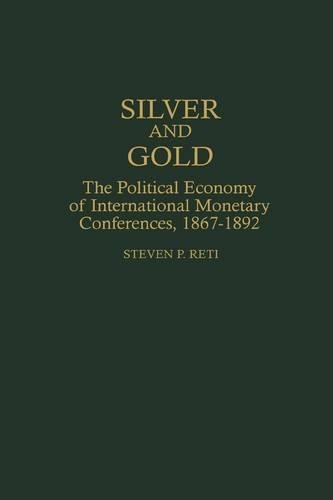
Silver and Gold: The Political Economy of International Monetary Conferences, 1867-1892
(Hardback)
Publishing Details
Silver and Gold: The Political Economy of International Monetary Conferences, 1867-1892
By (Author) Steven Reti
Bloomsbury Publishing PLC
Praeger Publishers Inc
26th May 1998
United States
Classifications
Tertiary Education
Non Fiction
Monetary economics
General and world history
332.46
Physical Properties
Hardback
224
Width 156mm, Height 235mm
539g
Description
For many observers of international politics, the classical gold standard is the premier example of successful international monetary cooperation. Curiously, most studies portray this 19th century system as a spontaneous development. Reti, after a thorough investigation of diplomatic records, argues that the gold standard grew out of several years of international negotiation. At the Conference of 1867, delegates for 20 states debated the monetary standard and agreed to adopt gold as soon as possible. In response to worldwide deflation from 1873 to 1896, the Conferences of 1878, 1881, and 1892 reconsidered the merits of gold, and the leading states reaffirmed their adherence to the gold standard. Reti uses theories of international regimes to explain the roles of hegemonic power, domestic politics, and causal beliefs on conference diplomacy. He asserts that the classical gold standard can best be understood as a coordination game in which negotiations informed nations about how to cooperate.
Reviews
"Bimetallism has lately attempted an intellectual comeback since the 1870s at the hands of Milton Friedman and Marc Flandreau of Paris....Silver and Gold suggests that the issues were more complicated than American and/or French 'Crimes of 1873.' Reti...approaches the issue from domestic politics, international-relations theory, and to a lesser extent economic analysis, and concludes that the four international conferences to resolve the issue...led inexorably to the gold standard winning out over unilateral bimetallism in the US after France gave up....A solid contribution to financial history and international politics."-Charles P. Kindleberger Ford International Professor of Economics, Emeritus Massachusetts Institute of Technology
"Steven Reti has scoured the sources for the four major international monetary conferences of the late 19th century in the hope of clarifying the processes of coordination and cooperation among governments in critical matters--in this case, the standard of money. His affirmation of coordination-game theory, rather than alternative hypotheses, goes far to explain the persistence and spread of the international gold standard before World War I."-Walter Nugent Andrew V. Tackes Professor of History University of Notre Dame
"Steven Reti's Silver and Gold is an excellent study of the international politics of monetary policy under the classical gold standard....He analyzes [the] international monetary conferences in fascinating and informed detail, showing how the central role of the United Kingdom, domestic politics, and the ideas of policymakers interacted to help sustain the gold standard. [This book] is an engaging, careful study of a crucial period in international monetary history. Both its subject and its approach are of great relevance to understanding today's international monetary relations."-Jeffry A. Frieden Professor of Government Harvard University
"Stylized facts are the enemy of serious scholarship. In this important study of the gold standard, Steven Reti provides the necessary corrective: a scrupulously documented account of the international diplomacy and domestic policies leading to the emergence of that international regime. Monetary theorists and political scientists concerned to get their facts right should pay it close attention."-Barry Eichengreen John L. Simpson Professor of Economics and Political Science University of California, Berkeley
"This fine book orchestrates an important and interesting integration of theory and careful historical analysis to explain developments in a long unappreciated subject in international political economy: monetary relations before World War I. Reti marshals a theoretical argument that nicely synthesizes game theory (coordination games) and hegemonic stability theory to account for important changes in monetary regimes in the late nineteenth century. This book is a must-read for anyone interested in the political economy of money."-Giulio M. Gallarotti Professor of Government Wesleyan University
"With this comprehensive reconstruction of 19th century monetary diplomacy, Steven Reti breaks new ground in the historiography of the classical gold standard. With meticulous care he documents the key role that multilateral negotiations played in the origins and functioning of the pre-World War I currency order, adding new insight to recent debates over the political economy of interstate cooperation. This book is a must-read for all students of international monetary history."-Benjamin J. Cohen Louis G. Lancaster Professor of International Political Economy University of California, Santa Barbara
.,."recommended to anyone who wishes to become informed of diplomatic efforts to resist the dominant market and political forces reflected in the above data."-EH.NET
...recommended to anyone who wishes to become informed of diplomatic efforts to resist the dominant market and political forces reflected in the above data.-EH.NET
The book is an interesting account of the international monetary conferences of 1867, 1878, 1881, and 1892, and is recommended to anyone who whishes to become informed of diplomatic efforts to resist the dominant market and political forces reflected in the above data....The story is well told.-H-Net Reviews
..."recommended to anyone who wishes to become informed of diplomatic efforts to resist the dominant market and political forces reflected in the above data."-EH.NET
"The book is an interesting account of the international monetary conferences of 1867, 1878, 1881, and 1892, and is recommended to anyone who whishes to become informed of diplomatic efforts to resist the dominant market and political forces reflected in the above data....The story is well told."-H-Net Reviews
Author Bio
STEVEN P. RETI is a visiting research scholar at the University of California, Santa Barbara. He has been a visiting professor at Austin College in Sherman, Texas, and at Scripps College in Claremont, California.
